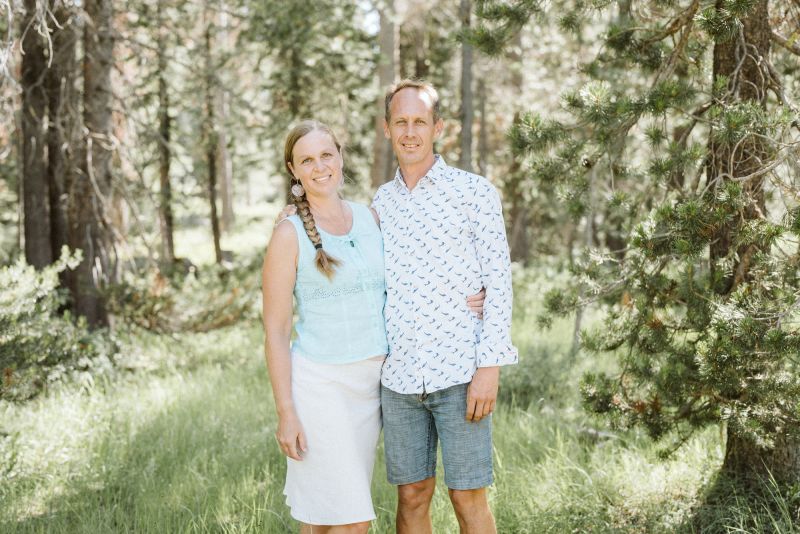Splashing out an apartment in the south of France and renovating it yourself may sound like a difficult – and hugely expensive – task.
But this couple have managed to do it twice, all while on a relatively tight budget.
Eric Freeze, originally from Canada, and his wife Rixa, from the US, spent several summers in the region as part of a study abroad program when they were in their 20s, and always felt a strong attachment to Nice.
But the pair, who married in 1998, began seriously looking into purchasing a property in the city after having their four children, Zari, 16, Dio, 14, Inga, 12, and Ivy, 10.
In 2014, they asked a realtor to look for a suitable property for the whole family in Old Nice, a historic neighborhood filled with tenements, churches, and squares.
Nice project
“It was always the place that we were most interested in going and trying to find a place where we could raise our children bilingually,” explains Eric.
They went on to purchase a two-bedroom apartment, which had previously been used as a student rental, for 235,000 euros and spent around a year renovating it themselves.
“We bought it with a mortgage, which is also kind of a miracle,” says Eric, a university professor. “It’s not that difficult for foreigners to buy in France. But it is difficult if you’re getting a loan.”
While the property was habitable, it needed a good deal of work. The couple spent a year or so completing the renovations themselves, which involved putting in new flooring and repainting the walls, as well as transforming the annex area into a bedroom for their children.
“That first year, we were renovating with four kids aged from one to seven,” explains Rixa, an academic and birth-educator. “There was dust and tools everywhere. It was kind of chaotic.”
With their budget already stretched thin, they tried to be as frugal as possible to avoid going into further debt. Eric even learned how to spearfish so that they could save on their food budget.
Meanwhile, Rixa spent most of any free time she had looking for pre-used items, including dishes, for their new place.
Frugal living
“I know Nice so well on foot because I walked everywhere, finding second-hand deals to furnish the apartment,” she says, estimating that they spent around $7,000 to 8,000 on the renovations.
While they were working on the property, Eric began searching for a second apartment that their friends and family could use.
Aware that they didn’t really have the funds for another place at the market rate, he started looking at listings for abandoned properties, with the hope of getting in touch with the owners to see if they’d be willing to sell for an affordable price.
Eric eventually came across a former communist office, which happened to be undernether their apartment, that was still owned by Jeunes Communistes (JC,) or “Young Communists,” a branch of the French Communist Party, and approached them about purchasing it.
Although the couple first made contact with the political party in 2014, it wasn’t until around 2020 that they agreed to sell it to them.
“At the time, we didn’t have enough money to buy it,” says Rixa. “But they said, ‘we don’t have the title work done for it. And that will probably take a little while, but we are interested in selling it.’”
According to the couple, the political party informed them that they already had an interested investor, but were keen to sell the property to someone who cared about it rather than someone “out to make money,” so there was room for negotiation on the price.
“He [the representative] was like, ‘I want a family to have this. I want [it to go to] someone who cares about it and is going to live there,” explains Rixa.
The Freezes went on to purchase the property, which had been separated into two separate sections, for 175,000 euros.
‘Little village’
By then, the couple, who have visitor visas and do not work in France, had worked out a routine that saw the family spend seven months of the year in France and five in their US base near Indianapolis in Indiana.
“He [Eric] renegotiated his university job down to halftime and half salary, so that we could raise our kids and put them in schooling in France for more than half the year, every year to keep their language skills up,” explains Rixa. “So we just go back and forth every year.”
They say that living in Old Nice is like “living in a little village” and they’ve formed many strong friendships with locals over the years.
“We joke that if we walk out of our door, at least within five minutes, we’ll run into somebody we know,” adds Rixa.
When the sale for their second apartment finally went through in 2020, the couple were prepared to throw themselves into the renovation work once again. But this would prove to be a much bigger job.
“It was just a complete shell,” says Eric.
As the property had already been split into two parts, the Freezes decided to transform it into two separate one-bedroom apartments.
While they had more funds to put into the project this time round, the Freezes certainly didn’t have enough to hire experts to do it for them.
“A lot of things that we were wanting to do, they’re the kinds of things that would have just been completely cost prohibitive to have an artisan or somebody do,” explains Eric. “Especially on the timeframe and the budget that we’re working with.”
Big job
They gutted both apartments, removing the plaster from the rock walls, and tearing out the existing flooring. The couple also ripped out the cables and rewired the apartments, and went on to install new plumbing.
They put in new insulated windows and dry walls, resurfaced the plaster walls and even installed a new mezzanine to each of the apartments.
The couple put a lot of care and attention into restoring an intricate renaissance-era wood ceiling, which they’d discovered in one of the apartments after the plaster ceiling was torn out.
“We found a few vestiges of the original ceiling,” explains Rixa. “Using these original pieces of molding, we had new wood moldings made and then restored everything to how it had been before.”
Rixa hand painted and stenciled the ceiling herself, using a pattern found on a Renaissance-era desk they’d bought second hand.
The couple had more “financial flexibility” for this renovation, which meant that they didn’t have to tighten their belts quite so much.
“Again, we did the work ourselves, but we could buy more expensive materials and put a little more money into it than the first time around,” adds Rixa.
Rixa’s father, who is a woodworker, was able to come over from the US for a few months to help them out with some of the work, including the staircases.
“The way to get my dad to visit us is to say, ‘OK, let’s renovate every day,’” she jokes.
The total cost of the renovation for both apartments, which they named “Le Chateau” and “Le Catamaran” came to around $88,000.
The couple, who previously renovated several homes in the US, completed the work in April and have been able to host their families, as well as occasionally rent it out to other travelers, in the months since then.
The Freeze’s say that their life in Nice is very different to the life they have in the US, and being able to spend several months of the year in the French city is benefiting their family significantly.
“For us, it fits a lot of the values of our family more closely than living in the US,” says Eric.
“It’s a place that you don’t need a car. We’re about a two-minute walk from the beach, a two-minute walk to fresh markets, and a two-minute walk to the kids’ schools.
“The kids can come home from school at lunchtime, so they come home and eat. We see them a lot more regularly.”
Complete transformation
He also points out that Old Nice is a place that “preceded cars” so it has much more of a neighborhood feel and lots of shared outdoor space.
“It’s designed for people,” he says. “I think it actually facilitates relationships and sharing space in a way that we don’t get in the US, which is often ruled by the car. Where people live in suburbs, and they’re separated a lot more.”
For Rixa, the social aspect of Old Nice has been one of its biggest plus sides, particularly when it comes to their children, who attend school in both France and the US.
“If you want to play with a friend in the US, you have to make a playdate and arrange a time to get together with your child’s friend,” she says. “Because everybody’s busy, you don’t just run into each other.
“But in France, you can just go out the door and go to the ocean, or the nearest park, and you’re going to see your child’s friends. They’re going to find someone to play with just by heading out. Almost guaranteed.”
While they’re aware of other expats who have struggled to adapt to living in France, they say their experience has been very much positive.
“It’s been a very welcoming, diverse space for our family,” says Eric.
Having spent a lot of time in Old Nice over many years, both Eric and Rixa have noticed a change in the area over the last two decades or so, as its popularity has grown and more people have moved in.
“It’s kind of interesting that it’s changed so dramatically,” says Rixa. “It is gentrifying a lot, which is beautiful. But it’s also a little bit unfortunate, because it pushes families out.”
Eric explains that they have good friends who live in rent-controlled housing, and are concerned that things could change in the future.
“They’re like, ‘If this changes, we can’t live here anymore.’ And that would be terrible,” he says, adding that the fact that Old Nice has been declared a UNESCO site has brought some comfort.
While they’d eventually like to live in Nice permanently, the couple say that moving back and forth between the US suits their family for now.
“One of the things that it’s done for us, is it’s kind of made our family more dependent on each other,” says Eric.
“It’s wonderful for our kids to be able to go back to France or to the US and reconnect with friends that they’ve had there before.
Unique experience
“But their primary peer group is our family. So it’s something that’s really created a family solidarity, because it’s such a unique and odd experience. I don’t think we would choose to do it any other way. At least right now.”
However, he acknowledges that this might change in the future depending on the needs of their children.
Eric, who has published a memoir, “French Dive,” about his family’s life in Nice, recognizes that starting a new life abroad can sometimes seem out of reach for people who don’t necessarily have a huge amount of money, but says this isn’t necessarily always the case.
“If people want to do it they can,” he says. “We don’t have a ton of disposable income. And I think sometimes, the way people present travel experiences, uprooting your life and going abroad, it can sometimes seem inaccessible for your average middle-class homeowner.
“But it is [accessible] if you do the right research, and try to connect people with people in an authentic way. That’s very much been our story and experience.”







































